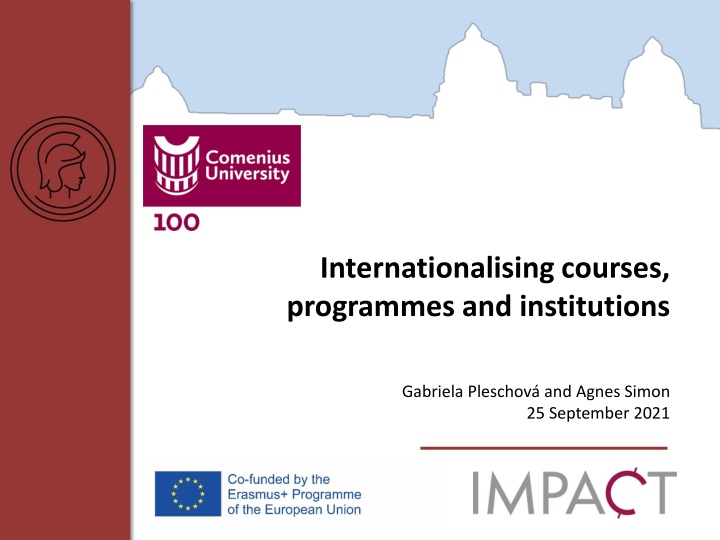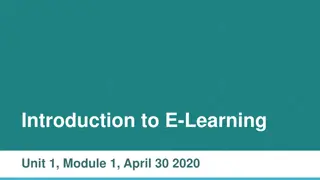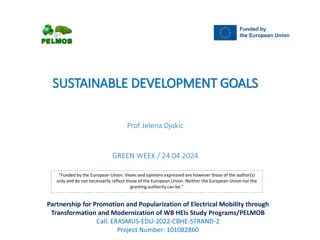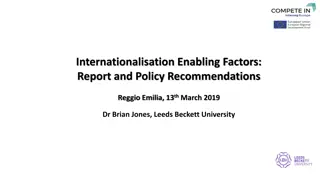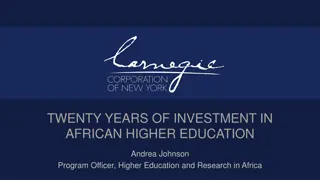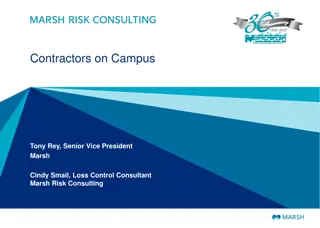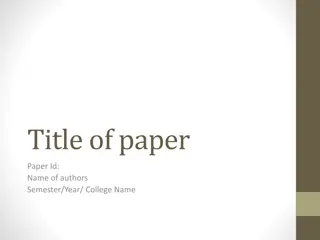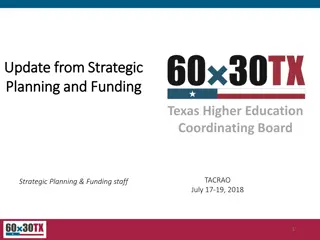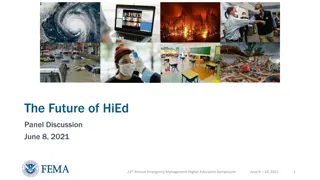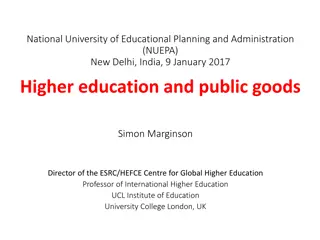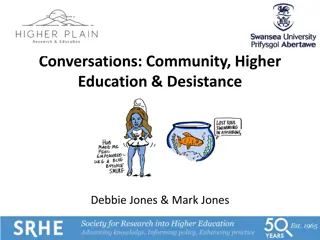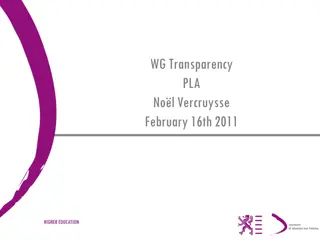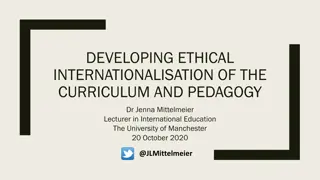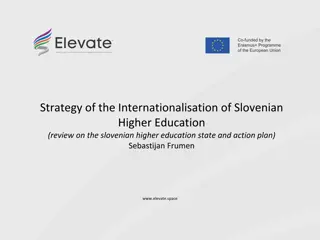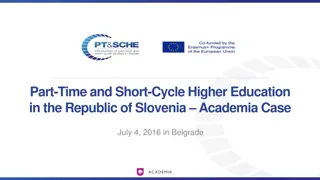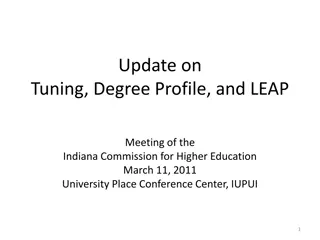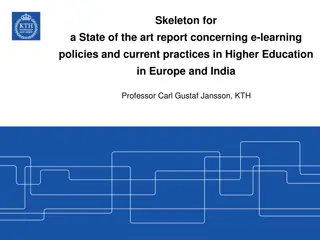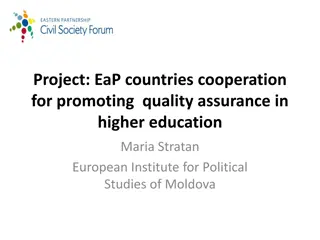Enhancing Internationalisation in Higher Education: Strategies and Best Practices
Explore the importance of internationalisation in higher education through a variety of perspectives, including curriculum development, teaching strategies, and promotional campaigns. Discover effective tools and methodologies for creating inclusive environments for both local and international students. Gain insights into course structures and learning outcomes that prioritize diverse student needs and engagement.
Download Presentation

Please find below an Image/Link to download the presentation.
The content on the website is provided AS IS for your information and personal use only. It may not be sold, licensed, or shared on other websites without obtaining consent from the author.If you encounter any issues during the download, it is possible that the publisher has removed the file from their server.
You are allowed to download the files provided on this website for personal or commercial use, subject to the condition that they are used lawfully. All files are the property of their respective owners.
The content on the website is provided AS IS for your information and personal use only. It may not be sold, licensed, or shared on other websites without obtaining consent from the author.
E N D
Presentation Transcript
Internationalising courses, programmes and institutions Gabriela Pleschov and Agnes Simon 25 September 2021
Working definition of internationalisation The inclusion of an international, intercultural and/or global dimension into the curriculum and teaching & learning process . (Knight 2004) After our presentations we invite you to share your university s experience with internationalisation
A task An external team invited to help introduce more English language courses to Faculty of Arts, Comenius University in Bratislava Is it enough to encourage and help teachers to teach in English?
Curriculum of Effective Teaching for Internationalisation. Literature review Understanding and reacting to student diversity Making teachers attentive to the situation of international students Allowing students to demonstrate engagement through multiple means Encouraging reflective learning Facilitating peer learning go beyond designing and teaching classes well
Advertising the course Broad campaign at UNIBA and MUNI Which strategies turned effective?
Tools we use SOTL Coaching Trust building Sending participants to present and learn from pedagogical conferences and pedagogical conversations
Learning outcomes recognize and meet the needs of local and international students use a variety of approaches, principles, concepts and methods to (re-)design and run BA/MA courses assess student learning and course outcomes in a self-reflective, enhancement- led and critical manner
Course structure Online Semester 1 Workshop series Classroom Semester 2 Teaching and research designs Coaching Semester 3 Teaching practicum and data collection Coaching Semester 4 Scholarship of teaching and learning paper (SOTL) Coaching
The workshop series Workshop 1 International students, diversity and internationalisation; Course introduction and introduction to SEDA values Designing courses for internationalized classrooms Facilitating courses for international students Supporting student learning online and introduction to the scholarship of teaching and learning Assessment practices with international students Interactive online tools Microteaching demonstration Workshop 2 Workshop 3 Workshop 4 Workshop 5 Workshop 6 Workshop 7 Workshop facilitators serve later as coaches
The SOTL approach Scientific study into one s own teaching To measure the effectiveness of internationalization Data triangulation Reflections Benefits Learn to think about impact in a systemic way Getting familiar with a new discipline Deeper understanding of the learning process Potential to publish
Coaching Key element of success Highly appreciated by participants Rated 9.46 on 1-10 scale; n=15
Coaching Coach open to ideas Feedback was on time Received useful advice from coach I could turn with questions to coach Fully agree Somewhat agree Neither agree nor disagree Somewhat disagree Fully disagree Coach was accessible Coach was supportive Coachee proactive in coaching relationship Got along well with coach
Coaching Key element of success Highly appreciated by participants Rated 9.46 on 1-10 scale; n=15 What they coach could do differently Nothing (most) Timely feedback, more detailed feedback (1-1)
Rationale for coaching Fits best with learning objectives, assignments, assessment Coach as critical friend, conversational partner
Coaching principles Coaching as partnership SOTL to develop teaching competencies Formative assessment prioritized Trust-building
Uniformity Coordinating coach Coach meetings (2 per semester) Handbook for coaches Regular contact with coaches MUNI IS: digital hub information on assignments, opportunities, events; submission of assignments and feedback Assignments and assessment Evaluation sheets Minimum (high) standards to graduate
Diversity Participants Varying background (discipline, teaching approach, teaching experience, research capabilities, interests) Different expectations toward coach Coaches Variation in background, expertise, approach to coaching
The coaching relationship 2-4 coachees per coach Chance to choose, coaches=1stsemester lecturers First contact No two identical coach-coachee relationship Coaches bring their personal style Continuous contact via email, video chat, phone
Benefits of coaching Facilitates pedagogical conversations Flexibility Support Helps detects problems Increases completion rate
Preliminary outcomes 27 redesigned or newly designed internationalised courses offered in 2021/22 12 accepted contributions at international teaching and learning conferences A course participant submitted for accreditation a degree programme in English Another course participant talked to her superiors about introducing systematic education for medical school teachers
References Pleschov , G. (2020) Supporting academics who teach international students. ETH Learning and Teaching Journal 2(2), 215 219 Knight, J. (2004). Internationalization remodeled: Definition, approaches, and rationales. Journal of Studies in International Education, 8(1), 5 31. Thank you for your attention! www.fphil.uniba.sk/impact
